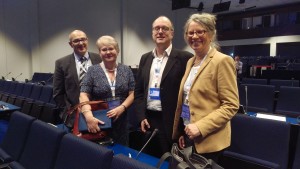BLOG – Iva Holmerova, new chair of Alzheimer Europe
 I have been working in collaboration with Alzheimer Europe for many years. The Czech Alzheimer’s Society was founded in 1997 and immediately afterwards became integrated into the Alzheimer Europe (established in 1990). As the Chairperson of the Czech Alzheimer’s Society, I had the opportunity to follow the development of Alzheimer Europe. Alzheimer Europe enabled us to form connections with many other Alzheimer’s Societies in Europe. Consequently, we were able to make use of their experience, learn from their materials, and meet at yearly conferences.
I have been working in collaboration with Alzheimer Europe for many years. The Czech Alzheimer’s Society was founded in 1997 and immediately afterwards became integrated into the Alzheimer Europe (established in 1990). As the Chairperson of the Czech Alzheimer’s Society, I had the opportunity to follow the development of Alzheimer Europe. Alzheimer Europe enabled us to form connections with many other Alzheimer’s Societies in Europe. Consequently, we were able to make use of their experience, learn from their materials, and meet at yearly conferences.
One of the first INTERDEM meetings also took place in Prague already 2004 where I met personally with the founder, Professor Esme Moniz-Cook. It was also an enriching experience to meet people from Alzheimer Europe. I really appreciate and I have always valued greatly the friendly and cooperative atmosphere, as well as the mutual support which is offered. That is why I was very happy to accept the nomination from our Society to the board of Alzheimer Europe, and I was honoured to be overwhelmingly elected chairperson to the board at the annual general meeting, having for a number of years been Vice Chairperson to Heike von Luetzau Holbein, who had decided to stand down.
Alzheimer Europe has blossomed as an organisation. From the outset, the Secretariat led by Jean Georges, has worked in a professional and friendly manner, and is currently a highly professional team, including not only administrative and project specialists, but also Scientific Officers (Dianne Gove, Ana Diaz and their new colleagues), PR specialists (Vanessa Chalinor), newsletter editor (Kate Ellis) and many more.
I consider the collaboration with the European Working Group of People with Dementia to be immensely important and inspiring. They are wise people, and their experience and insight into the issues around dementia is invaluable. In my opinion, this anchor is vital, as well as the collaboration with INTERDEM, which in turn guarantees the specialised and scientific quality of conferences and other scientific cooperation. Thanks to the experts and different expert and working groups, Alzheimer Europe produces a number of key materials, many of which address the ethical aspects of care. There is also much collaboration with politicians and with the European Commission. However, it is not possible to go into detail here about all of the major activities of Alzheimer Europe. For more information I can recommend our website and newsletters (http://www.alzheimer-europe.org/)!
In the Paris Declaration 2006, Alzheimer Europe called for Alzheimer’s Disease and other types of dementia to be made a public health priority, and in 2008, an important initiative followed under the support of the French Presidency of the European Union. In 2009, the British Prime Minister highlighted the theme of dementia as a priority for the G8 Summit and subsequently dementia was, almost without interruption, one of the most important points on the agenda of the Presidency of the European Union, most recently discussed at the conference in Bratislava during the conclusion of the Slovak Presidency. Many European countries have developed their own plans to tackle this problem, and I really believe and hope that Alzheimer Europe will also participate in the adoption of a strategy that will provide solutions to this problem in Europe.
In addition to the existing priorities of Alzheimer Europe which have placed an emphasis on ethical aspects and supporting and promoting the rights of people with dementia, I am very happy that attention will be given to the role of the Alzheimer’s Society in particular countries in Europe, as well as to the issues with quality of care and other partnerships in Europe. We know that Central and Eastern European countries are rarely involved in some of the European initiatives (for example, only 5% of the most important scientific projects). Therefore, I am glad that from the beginning, these countries are playing a collaborative and active role in Alzheimer Europe, such as the Polish, Romanian or Czech Alzheimer’s Societies, which are long-term members, and also younger but very active partners from Slovenia (organisers of a previous conference) or Croatia, and also new members Hungary, Bulgaria and Bosnia and Herzegovina. Together we can really make a difference.
